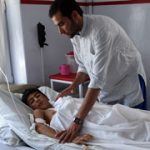Even in a world inured to violence, the U.S. airstrike on a Doctors without Borders (MSF) hospital in Kunduz, which killed both staff and patients, was shocking. While the U.S. government acknowledged that it was responsible for the attack, General John Campbell, the top U.S. commander in Afghanistan, has referred to the attack as an accident in which a few civilians were killed.
To be clear, 22 people were killed, including three children and 12 volunteer health professionals. The hospital had repeatedly sent the U.S. military and other groups fighting in the region the exact coordinates of the hospital so that it would not be bombed – accidentally or otherwise.
The U.S. military cannot just dismiss this attack as “collateral damage,” which would imply that the military knew what it was doing, but thought the harm to the hospital was proportionate to the military advantage of the attack. Nor is an “accident” an acceptable explanation as it indicates that the military acted without undertaking the due diligence required to ensure the legitimacy of the target. General Campbell has admitted that the U.S. military did not follow its own protocols in carrying out this attack.
The U.S. military brings sophisticated and deadly weapons to the conflict in Afghanistan; it has a responsibility to deploy these weapons in a manner consistent with international humanitarian law. When it fails to do so and the consequences of that failure result in the deaths of civilians, it constitutes a war crime.
The claim that Taliban fighters were being treated at the hospital is a red herring, as wounded combatants are protected under the Geneva Conventions. The doctors working for the MSF hospital were risking their lives to fulfil their ethical obligation as health professionals to treat those in need regardless of political affiliations.
Over the last 14 years, the U.S. government has undermined international law by claiming that in its fight against terrorists, the rules do not apply. This argument is fundamentally flawed and deeply dangerous. In Syria, Bashar al-Assad has also shredded the laws of war claiming that all is fair in a fight against terrorists. Four years and 250,000 deaths later – the international community remains paralyzed on Syria and attacks on hospitals and the killing of doctors has become the new normal in the country.
The U.S. must own its responsibility in undermining the very laws that were carefully drafted and adopted over decades in an attempt to shield civilians from the hell that is war. But in Afghanistan, Gaza, Iraq, Syria, Yemen, and too many other conflict zones, it is civilians who are suffering as governments claim exceptions to the rule.
The international community must act to stop this deadly slide into lawlessness that will undo decades of hard-won gains in the protection of civilians. It can start by calling for an independent international investigation into the attack on the MSF hospital in Kunduz. And it must take forceful actions to stop violations in Syria and in other conflicts. No state is above the law, and no state should be allowed to rewrite the laws. The only way to begin restoring these weakened standards is by holding those who violate them to account.

